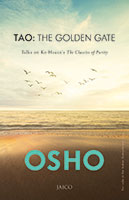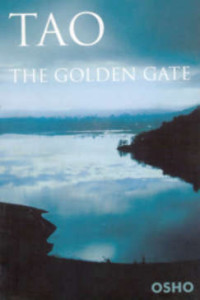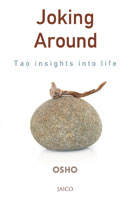Osho About Tao
“Tao seems to be the only life vision which is total. It does not deny the earth, it does not deny the  sky. It accepts both, it accepts the unity of both. It says the man who has come to know spontaneous purity and stillness, who has become relaxed with the whole, with the law of the ultimate — in him heaven and earth are united.
sky. It accepts both, it accepts the unity of both. It says the man who has come to know spontaneous purity and stillness, who has become relaxed with the whole, with the law of the ultimate — in him heaven and earth are united.
I believe in the whole. To me to trust the whole is the only way to be holy and to trust the whole is the only way to be whole. And when you are whole, life is bliss, life is benediction, life is celebration.” Osho
Talks on Ko Hsuan’s The Classic of Purity, deel 1 en 2
“To be able to celebrate life is religion — in that very celebration you come close to God. If one is able to celebrate, God is not far away; if one is not able to celebrate life, then God does not exist for him. God appears only in deep celebration, when you are so full of joy, that all misery has left you. ” OSHO
Dit boek Tao the Golden Gate bevat commentaren op de verhandelingen van Ko Hsuan die de titel “Classic of Purity” hebben. Over Ko Hsuan is alleen bekend, dat hij een geleerde was en Verlicht. Hij is afkomstig uit de  stroming Tao. En hij is van hetzelfde kaliber als de bekende Tao Meester Lao Tzu.
stroming Tao. En hij is van hetzelfde kaliber als de bekende Tao Meester Lao Tzu.
Tao is de unieke stroming, aldus Osho, die het leven als een Geheel opvat. Zowel de aarde als de hemel worden in het plaatje betrokken.
Materialisme alleen is eenzijdig en spiritualisme alleen is eenzijdig.
En een vertrouwen in het Al (Whole) is nodig in plaats van in Heilige zaken (Holy). Dan wordt je leven gelukkig en een viering.
Het boek Tao the Golden Gate is verkrijgbaar bij de Boekhandel of via internet.
Impressie van Tao the Golden Gate
Osho illumines the sutras of the famous sixth century scholar and enlightened master, Ko Hsuan, bringing the dynamic path of Tao alive for contemporary man, and answers seeker′s questions.
This way of Tao leads us through such topics as the usefulness of jokes in provoking greater awareness, the role of one′s conditioning in creating prejudice, and the unconscious strategies we all adopt that close us to the vitality and change that permeates existence. Osho answers questions on innocence and ignorance, and the nature of ambition, amongst many others.
Excerpt from: Tao: The Golden Gate, Vol.2, Joking Around
“The ego exists on misery – the more misery the more nourishment for it. In blissful moments the ego totally disappears, and vice versa: if the ego disappears, bliss starts showering on you. If you want the ego, you cannot forgive, you cannot forget – particularly the hurts, the wounds, the insults, the humiliations, the nightmares. Not only that you cannot forget, you will go on exaggerating them, you will emphasize them. You will tend to forget all that has been beautiful in your life, you will not remember joyous moments; they serve no purpose as far as the ego is concerned. Joy is like poison to the ego, and misery is like vitamins.”
all that has been beautiful in your life, you will not remember joyous moments; they serve no purpose as far as the ego is concerned. Joy is like poison to the ego, and misery is like vitamins.”
“You will have to understand the whole mechanism of the ego. If you try to forgive, that is not real forgiveness. With effort, you will only repress. You can forgive only when you understand the stupidity of the whole game that goes on within your mind. The total absurdity of it all has to be seen through and through, otherwise you will repress from one side and it will start coming from another side. You will repress in one form; it will assert in another form – sometimes so subtle that it is almost impossible to recognize it, that it is the same old structure, so renovated, refurnished, redecorated, that it looks almost new.
CLINGING to MISERY
“The ego lives on the negative, because the ego is basically a negative phenomenon; it exists on saying no. No is the soul of the ego. And how can you say no to bliss? You can say no to misery, you can say no to the agony of life. How can you say no to the flowers and the stars and the sunsets and all that is beautiful, divine? And the whole existence is full of it – it is full of roses – but you go on picking the thorns; you have a great investment in those thorns. On the one hand you go on saying,
“No, I don′t want this misery, ” and on the other hand you go on clinging to it. And for centuries you have been told to forgive.
“But the ego can live through forgiving, it can start having a new nourishment through the idea that, “I have forgiven. I have even forgiven my enemies. I am no ordinary person.
nourishment through the idea that, “I have forgiven. I have even forgiven my enemies. I am no ordinary person.
” And, remember perfectly well, one of the fundamentals of life is that the ordinary person is one who thinks that he is not; the average person is one who thinks that he is not. The moment you accept your ordinariness, you become extraordinary. The moment you accept your ignorance, the first ray of light has entered in your being, the first flower has bloomed. The spring is not far away.” Osho,Tao the Golden Gate